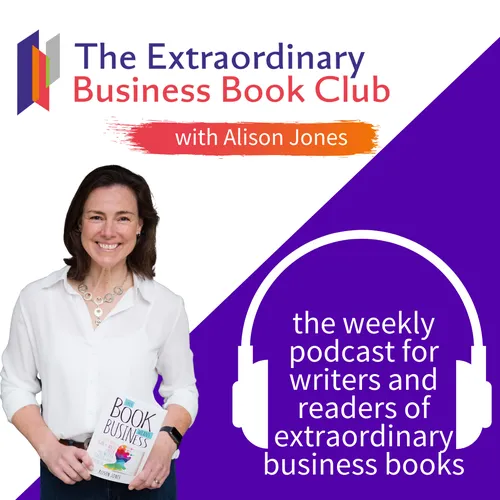
The Extraordinary Business Book Club
Alison Jones, publisher and book coach, explores business books from both a writer's and a reader's perspective. Interviews with authors, publishers, business leaders, entrepreneurs, tech wizards, social media strategists, PR and marketing experts and others involved in helping businesses tell their story effectively.
- Update frequency
- every 7 days
- Average duration
- 33 minutes
- Episodes
- 402
- Years Active
- 2017 - 2025

Episode 141 - Lead Like a Coach with Karen Morley
Karen Morley knew there'd be no problem writing about the principles of leading like a coach, and she found it relatively easy to structure her ideas and practice into a methodology. But how to bring…

Episode 140 - The Best Bits
A few of my favourite moments from the last few Extraordinary Business Book Club episodes, and this time we're thinking about grit, which comes through in different ways through all these conversatio…

Episode 139 - Being the champion of your book with Pete Williams
Writing a great book is a good start. But it's only a start. After that comes the marketing, which is every bit as important as the writing.
'If you're not going to be the biggest champion for your …

Episode 138 - Talking out the book with Elaine Halligan
Elaine Halligan has an extraordinary story. Her journey to becoming one of the world's leading parenting experts began with her own son's difficulties at school and her determination to do whatever i…

Episode 137 - Making the Boat Go Faster with Ben Hunt-Davis
'While we're doing one thing, let's just do it as well as we can and make sure we are spending our time, of which we have so little, let's spend it wisely.'
Ben Hunt-Davis knows a bit about focus. A…

Episode 136 - The Leadership Lab with Pippa Malmgren
'A 20th-century leader was very analytical, it's all about the drill-down into detail and numbers. But frankly, that did not serve us very well, and that's partly what led to everybody being blindsid…

Episode 135 - Be More Pirate with Sam Conniff Allende
"You've got to ask yourself what is more important. Is it selling books, or starting a movement?"
Sam Conniff Allende is in the business of movement-making. A young entrepreneur himself, he’s since i…

Episode 134 - Real Confidence with Michelle Sales
'Now, I look at work and life and what I know in a different way, it's almost like I'm attuned to looking for opportunities to bring my thinking together and get it out there by way of a book.'
Miche…

Episode 133 - Ghostwriting and Frankendrafts with Derek Lewis
'The first draft of the manuscript is just ugly. There are pieces, and parts, and this part doesn't match that part. It looks like a Frankenstein monster. And that's why I call it Frankendraft. It se…

Episode 132 - Design your life with Ayse Birsel
'When you're being creative, all you're trying to do is see the same things differently, and from that, see if you can drive new ideas, solutions and new value.'
Ayse Birsel, multi-award-winning desi…

Episode 131 - An Unforgettable Launch with Michael Brown
This is a very special episode for lots of reasons.
Firstly because it's shorter than usual.
Secondly because much of it was recorded live at one of the most memorable book launches I've ever attende…

Episode 130 - The Best Bits!
A hand-picked selection of treasures from the last few Extraordinary Business Book Club episodes, with the focus on other people - how can they help you write a better book, faster, what impact will …

Episode 129 - Happy Money with Elizabeth Dunn
Money can't buy you happiness - unless you're smart about it. Dr Elizabeth Dunn reveals the surprising ways in which money CAN make us happier, and also why it so often fails to do so. Along the way …

Episode 128 - Writing and speaking with Hugh Culver
Hugh Culver has done a lot of stuff in his life - from leading adventure holidays in the Antarctic to giving keynote speeches to companies and conferences all over the world.
For him, writing a book…

Episode 127 - Leading Through Uncertainty with Jude Jennison
Horses don’t care what your job title is. They’re not impressed by the car you drive. The only way a horse will follow you is if it trusts you. And it will trust you only if you’re leading authentica…

Episode 126 - Writing backwards with Andrew Davis
'I've finally decided that I really should be writing books backwards.'
Instead of locking himself away in a room to write a book (as he did first time round), or even getting some supporting researc…

Episode 125 - Getting social with Michelle Carvill
For many CEOs, 'doing' social media is terrifying. Much easier to hire a millennial to do it for you. But in a world in which trust in corporates is at an all-time low, Michelle Carvill argues the be…

Episode 124 - Finding your story with Martin Norbury
Most business book authors aren't professional writers. Martin Norbury failed his English O-level twice, but he knew that he had a story to tell that mattered. In this week's conversation he reveals …

Episode 123 - Becoming a Superhero with Sarah Windrum
What's your mission statement?
We can get caught up in business - and indeed in business writing - in showcasing ourselves. We airbrush the version of ourselves that we present to others. And in doi…

Episode 122 - The Paula Principle with Tom Schuller
In the 1960s, Professor Laurence Peter articulated the famous Peter Principle: that an employee in a hierarchy tends to be promoted to 'his level of incompetence'.
As he looked at the evidence of wo…